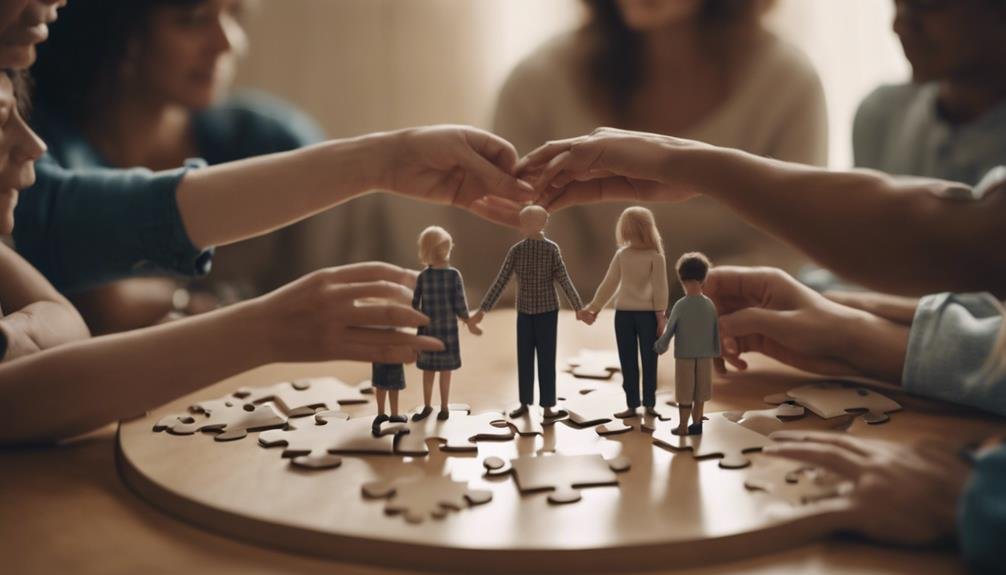To rebuild family life post-domestic violence, start by acknowledging trauma and seeking guidance. Create a safe environment for healing by removing harmful objects and seeking support. Address power imbalances through therapy to foster equality and respect. Foster trust and understanding by setting clear boundaries and promoting open communication. Learn healthy coping mechanisms like self-care and support groups for emotional well-being. Commit to open communication and break the cycle of violence by setting boundaries and seeking therapy. Build a nurturing family dynamic by creating a safe space for honest conversations. Cultivate patience and compassion in your journey towards healing and growth.
Key Takeaways
- Seek professional therapy for guidance and healing.
- Establish safety measures and a security plan.
- Address power imbalances and promote equality.
- Learn healthy coping mechanisms for emotional well-being.
- Foster open communication and trust within the family.
Acknowledge Trauma and Seek Guidance
To begin rebuilding family life after domestic violence, acknowledging the emotional trauma and seeking professional guidance are vital steps toward healing and growth.
Family therapy can provide a safe and supportive environment for processing the impact of domestic violence, rebuilding trust, and fostering healing within the family unit. It offers a space where complex emotions can be navigated, relationships can be repaired, and healthy dynamics can be promoted.
Therapists, specializing in family therapy, play an essential role in guiding families through the healing process post-domestic violence. By addressing the trauma and seeking therapy, families can work towards understanding the effects of the violence, improving communication, and fostering growth within the family unit. Through therapy, individuals can learn coping mechanisms, develop healthier relationships, and create a nurturing environment where healing can take place.
Create Safe Environment for Healing
You’ve taken a courageous step in prioritizing safety measures at home to create a nurturing environment for healing.
Establishing support networks will provide you with a strong foundation during this journey of rebuilding your family life post-domestic violence.
Safety Measures at Home
Creating a safe environment for healing after domestic violence involves implementing important safety measures at home to protect yourself and your loved ones. Start by installing security systems, changing locks, and establishing a safety plan to guarantee a secure living space. Removing any weapons or harmful objects from the household is essential to prevent the escalation of violence.
Seek support from local shelters, helplines, or advocacy organizations for additional safety resources and guidance. Educate all family members, especially children, about safety protocols and emergency contacts in case of danger. Consider counseling or therapy to address trauma, develop coping skills, and promote healing within the family unit.
Support Networks for Healing
Establishing a strong support network is key to creating a safe environment for healing and growth after experiencing domestic violence. Support networks play an essential role in providing emotional support, guidance, and resources to help families rebuild after such traumatic experiences.
These networks, led by professionals trained in assisting survivors of domestic violence, focus on facilitating open communication, trust-building, and equipping families with coping mechanisms and conflict resolution strategies. By seeking help from support networks, families can break the cycle of violence and promote healing and resilience.
It’s important to remember that healing is a journey, and having a supportive community can make all the difference during this process. Remember, you aren’t alone, and reaching out for support is a courageous step towards creating a safe and nurturing environment for yourself and your loved ones post-domestic violence.
Address Power Imbalances

Addressing power imbalances within your family is essential for rebuilding a healthy dynamic post-domestic violence.
Take the time to acknowledge any control dynamics that may exist, and work towards fostering equality and respect among all family members.
Seeking professional support, such as family therapy, can provide valuable guidance in managing these complex issues and promoting a harmonious environment for everyone involved.
Acknowledge Control Dynamics
To foster healthier family dynamics post-domestic violence, it’s essential to recognize and confront the existing power imbalances within your family structure. Control dynamics can have a profound impact on relationships, often leading to communication breakdowns and feelings of inequality. By acknowledging these power imbalances, you’re taking the first step towards rebuilding trust and promoting a more balanced family environment.
Understanding how control dynamics operate within your family is key to establishing healthier relationships and boundaries. Family therapy can be a valuable resource in identifying and addressing these dynamics, offering a safe space to explore and navigate these complex issues.
Creating awareness around control dynamics empowers each family member to play a role in fostering equality and respect within the family unit.
Foster Equality and Respect
Recognizing and dismantling controlling behaviors is vital for creating a more balanced and respectful family environment post-domestic violence.
Addressing power imbalances within family dynamics is essential to foster equality and respect.
Establishing clear boundaries and promoting open communication are key steps in fostering a healthier family dynamic.
Encourage mutual decision-making and shared responsibilities to make sure that power is distributed equitably among family members.
By actively working towards dismantling any lingering controlling behaviors and addressing power imbalances, you pave the way for a more harmonious and respectful family life.
Remember, every member of the family deserves to feel valued and respected.
Seek to create an environment where everyone’s voice is heard, opinions are considered, and decisions are made collectively.
Embracing equality and respect within the family unit will contribute to rebuilding trust and fostering healthier relationships post-domestic violence.
Seek Professional Support
Seeking professional support post-domestic violence is essential for addressing power imbalances within the family unit and fostering healing and growth. Family therapy offers a structured environment where trauma complexities can be navigated, and trust can be rebuilt. Therapists play an important role in facilitating open communication, understanding, and healing among family members.
Techniques like Cognitive Behavioral Therapy (CBT) and Trauma-Focused Cognitive Behavioral Therapy (TF-CBT) are valuable tools that help identify negative patterns and promote healing. Collaborating with specialists for tailored interventions can greatly aid in addressing trauma triggers effectively.
Foster Trust and Understanding
In the journey towards rebuilding family life post-domestic violence, fostering trust and understanding serves as the cornerstone for healing and growth. Trust, once shattered, can be challenging to rebuild, but with patience and commitment, it’s possible.
Open and honest communication, coupled with empathy, are essential in nurturing trust within the family unit. Understanding the impact of domestic violence on the dynamics of the family is key in moving forward.
Family therapy can provide a safe environment to address trauma, rebuild trust, and promote understanding among family members. It offers a platform for each family member to express their feelings, fears, and hopes, fostering a deeper connection and mutual understanding.
Establishing healthy boundaries and promoting mutual respect are necessary steps in rebuilding trust within the family.
Learn Healthy Coping Mechanisms

Developing healthy coping mechanisms is essential for your emotional well-being and resilience as you navigate life after experiencing domestic violence. Engaging in self-care activities such as exercise, mindfulness, or hobbies can greatly aid in coping with the trauma you have endured. These practices can reduce stress, promote emotional well-being, and help you process challenging emotions effectively.
Seeking therapy or joining support groups can provide valuable guidance on developing healthy coping strategies tailored to your needs. Through these resources, you can learn to identify triggers and implement positive coping skills vital for your long-term healing journey.
Develop Resilience and Strength
You’ve been through a lot, but you’re stronger than you know. Cultivating inner strength and building emotional resilience will help you navigate the challenges of rebuilding your family life after domestic violence.
Cultivate Inner Strength
To rebuild your family life after experiencing domestic violence, it’s essential to nurture your inner strength by recognizing your worth, setting boundaries, and seeking support.
Cultivating inner strength post-domestic violence is a powerful process that involves acknowledging the resilience within you. By recognizing your personal worth, you lay the foundation for healing and growth. Setting boundaries is vital in protecting yourself and creating a safe environment for you and your loved ones. Seeking support from therapists or support groups can provide you with the guidance and encouragement needed to navigate through the challenges you may face.
Developing resilience and inner strength post-domestic violence empowers you to cope with trauma, manage stress, and cultivate healthy coping mechanisms. This strength enables you to break the cycle of violence, promote healing, and foster positive relationships within your family. Remember, your inner strength is a powerful tool that will guide you towards a brighter future filled with hope and resilience.
Build Emotional Resilience
As you work on building emotional resilience post-domestic violence, consider seeking therapy as a way to process trauma and develop healthy coping mechanisms. Therapy can provide a safe space to explore your feelings, understand the impact of domestic violence, and learn effective strategies to manage emotions.
Additionally, participating in support groups can offer a sense of community and connection with others who’ve walked a similar path, fostering a supportive environment for growth.
Emotional resilience is essential for handling triggers and setbacks that may arise during the healing journey. By building inner strength and seeking professional help, you can develop the tools needed to adapt to a new, healthier family dynamic.
Foster Family Unity
To cultivate resilience and strength within your family post-domestic violence, focus on fostering open communication, trust-building, and mutual support. Building family unity requires creating a safe space where every member feels valued and heard. Encourage honest conversations about emotions, experiences, and needs to rebuild trust and strengthen your bond.
By actively listening and validating each other’s feelings, you can work together to address past trauma and move forward as a united front.
Rebuilding trust after experiencing domestic violence may take time, but it’s essential for restoring harmony within your family. Acknowledge the challenges you have faced, seek professional guidance if needed, and commit to growth as a family unit.
Remember that resilience grows through shared experiences and support. By facing adversity together and fostering a culture of understanding and compassion, you can rebuild family unity and create a strong foundation for the future.
Commit to Open Communication

Engage in honest and open conversations with your family members as you navigate the journey of rebuilding family life post-domestic violence. Communication and trust are essential pillars in this healing process. By fostering open dialogue, you create a space where everyone can express their thoughts, feelings, and concerns without fear.
Encouraging each family member to communicate openly helps in building understanding and strengthening bonds. Practice active listening during conversations to show respect and empathy towards one another. Setting boundaries can also aid in maintaining a safe and respectful environment.
Acknowledge the past experiences and emotions that may have caused pain, and work together towards healing and moving forward as a family unit. Consider implementing effective communication strategies like family meetings or therapy sessions to enhance relationships and address underlying issues.
Break the Cycle of Violence
Breaking the cycle of violence within your family starts with acknowledging the impact it has had on each member and committing to positive change.
The intergenerational cycle of violence can put children at a higher risk of becoming victims or abusers without intervention, affecting their emotional and behavioral well-being. Witnessing domestic abuse can lead to lasting trauma and difficulties in forming healthy relationships.
To break this cycle, targeted interventions and support are essential. The impact of domestic violence can result in breakdowns in communication and heightened conflict within the family unit.
Seeking family therapy post-domestic violence is necessary to rebuilding trust, healing emotional wounds, and fostering healthy relationships. By actively working towards breaking the cycle of violence, you can create a safer and more nurturing environment for yourself and your loved ones.
Build Nurturing Family Dynamic

Creating a nurturing family dynamic post-domestic violence involves fostering trust, open communication, and a sense of equality among all members. Building healthy relationships within the family unit is important for healing and moving forward positively.
Family therapy plays a significant role in promoting understanding, addressing negative patterns, and rebuilding trust. Through techniques like Cognitive Behavioral Therapy (CBT) and Trauma-Focused Cognitive Behavioral Therapy (TF-CBT), therapists help family members navigate trauma symptoms and work towards healing together.
During therapy, the focus is on establishing healthy power balances and promoting equality to prevent further conflict. By addressing resistance and trauma triggers, therapists assist in breaking the cycle of violence and fostering a safe environment for all family members. It’s crucial to recognize the challenges that may arise, such as barriers to change, and work through them with patience and perseverance.
Cultivate Patience and Compassion
Cultivating patience and compassion is vital in the journey of rebuilding family life post-domestic violence. In the aftermath of an abusive relationship, it’s essential to approach each other with understanding and empathy. By actively listening to one another and acknowledging each other’s feelings, you create a safe space for healing to begin. Compassionate communication not only heals wounds but also fosters a healthy dynamic within the family.
Patience is key as you navigate this challenging process. Progress may be gradual, but every small step towards rebuilding trust is significant. Remember, healing takes time, and it’s okay to move at a pace that feels comfortable for everyone involved.
Frequently Asked Questions
How Can I Support a Family Member Who Is in Denial About the Abuse?
You can offer support to a family member in denial about abuse by gently expressing concern, providing emotional support, offering to listen, suggesting counseling, and connecting them with community resources. Encourage open communication and be patient.
What Are Some Ways to Rebuild a Sense of Safety and Security at Home?
Feeling safe in your home is essential. Consider home renovations for a fresh start. Seek counseling support for emotional healing. Establish safety protocols to rebuild trust. You deserve a secure and peaceful environment.
How Can I Address Power Imbalances Without Creating Conflict?
To address power imbalances without conflict, try open communication strategies and conflict resolution techniques. Understand power dynamics, set healthy boundaries, and prioritize mutual respect. By fostering understanding and cooperation, you can navigate challenges effectively and build healthier relationships.
What Steps Can I Take to Rebuild Trust After Experiencing Betrayal?
To rebuild trust after betrayal, start by rebuilding communication. Listen actively, express your feelings honestly, and work together on understanding each other. Establish clear boundaries that promote respect and safety for both parties.
How Do I Ensure I Don’t Unintentionally Repeat the Cycle of Violence?
Ensuring you don’t perpetuate violence starts with therapy support. Establish clear communication boundaries. Reflect on past behaviors, seek understanding, and commit to growth. Choose empathy, learn healthy conflict resolution, and break the cycle.
Conclusion
In rebuilding family life after domestic violence, remember that healing takes time and effort. By acknowledging trauma, fostering trust, and breaking the cycle of violence, you can create a safe and nurturing environment for your loved ones.
Embrace patience and compassion as you navigate this journey together. Remember, the road to recovery may be long, but with dedication and support, your family can emerge stronger and more resilient than ever before.
Keep moving forward with courage and hope.







